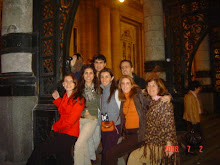
Picture : Susann Graham as Ifigenia at Chicago's Opera, 2006.
To go in avant, to the next opera (post-Barber of Seville, which we will enjoy on September 5. ) , our next opera on Saturday September 20. , at 8 pm shall be :
Iphigénie en Tauride
It is considered the greatest work of Gluck and marked the culmination of his career. The idea of the “complete opera”, to put music for the service of poetry and dramatic achievement.
This opera is one of the most intense.
The opera by Gluck is a bridge between the Baroque and classical style. Gluck takes Opera seriously and makes it more direct, more visceral, more dramatic. Transform the opera into something compact, intense and emotional.
One detail to think of , it is that in such operas most of the key events have happened before the beginning of the opera, leaving the main characters cope with their emotional crises and personal conflicts.
Biography of Gluck
It is regarded as the great reformer of the opera, in the second half of the 18 century. Gluck was German by birth, but the most important of his career was developed in Vienna and Paris.
Until he started to create, operas were designed according to tastes and moulds which joined plots to vocal pyrotechnics of a true elite of singers who saw the genre almost exclusively as the only way to develop and showcase their talents.
The purpose of Gluck (Germany, 1714 -1787) was to produce a conjunction between music and drama.
He could materialize his project, but not from the first time.
So when the time was propitious, he went back to the ancient tradition, extracting the best of it.
The most famous of all Gluck’s Operas is "Orpheus and Eurydice", premiered in 1762. Apart from it contained some relief "Alceste" in 1767 and then "Ifigenia in Aulide" in 1774 and, as a sort of continuation, "Ifigenia in Tauride" in 1779.
This is the penultimate opera of Gluck, which he gives the final steps toward the reform that he was looking to give the lyric genre. It has a libretto by Nicolas-Francois Guillard, based on the Euripides tragedy of the same name and a drama of the Guymond Touche
In adapting the music to the story, the play achieves a full humanization of the plot, surpassing even the mythological view. "Ifigenia in Tauride" was premiered in France, the Opera Theatre of Paris on May 18, 1779.
Argument
The action takes place in four events after the Trojan war, in the 13 century BC.
We must know that Ifigenia is the daughter of Agamemnon, king of Mycenae. This has been murdered by his wife Clytemnestra, who immediately has also been murdered by his son Orestes. Ifigenia is ignorant of these events and has become a priestess of Diana on the island of Tauride, inhabited by the Scythians.
First Act
A storm shakes the island.
In the temple of Diana are several maids who worked as Greek priestesses.
These are leadered by Ifigenia.
The king arrives, he has had terrible dreams and fears for his life.
Source: www.beethovenfm.cl































No comments:
Post a Comment